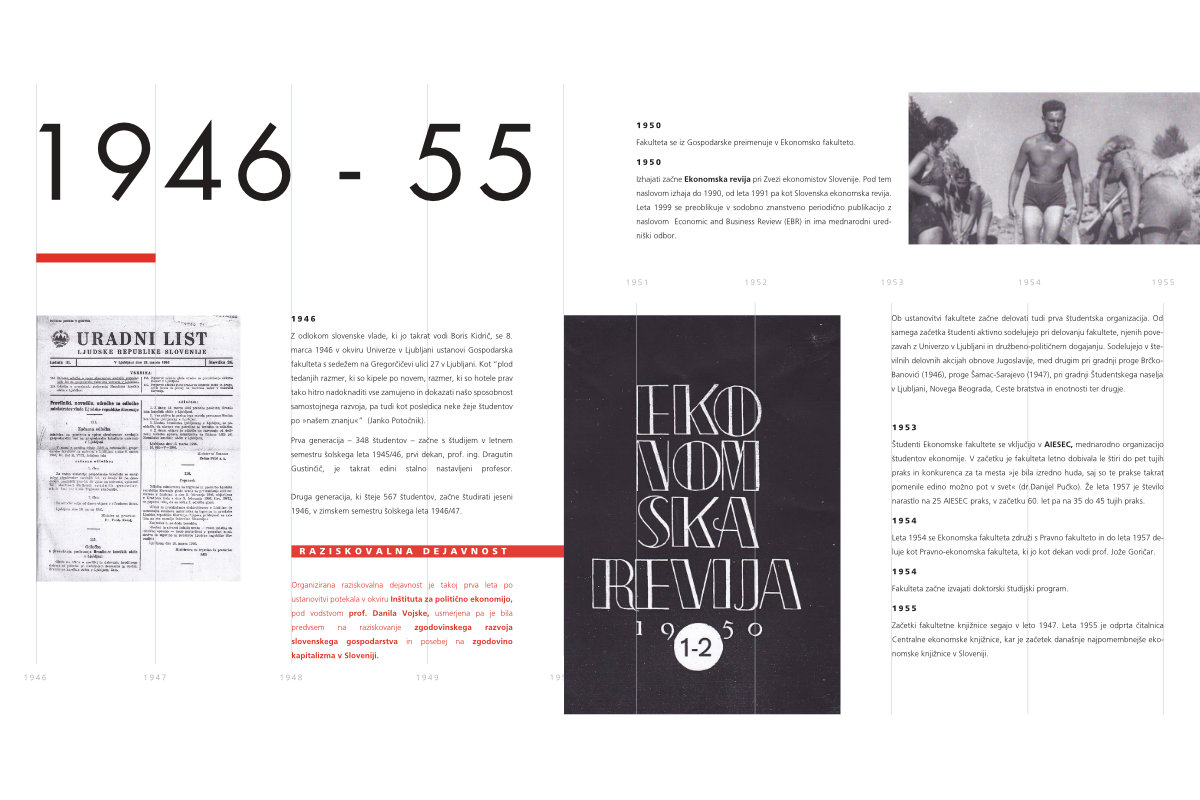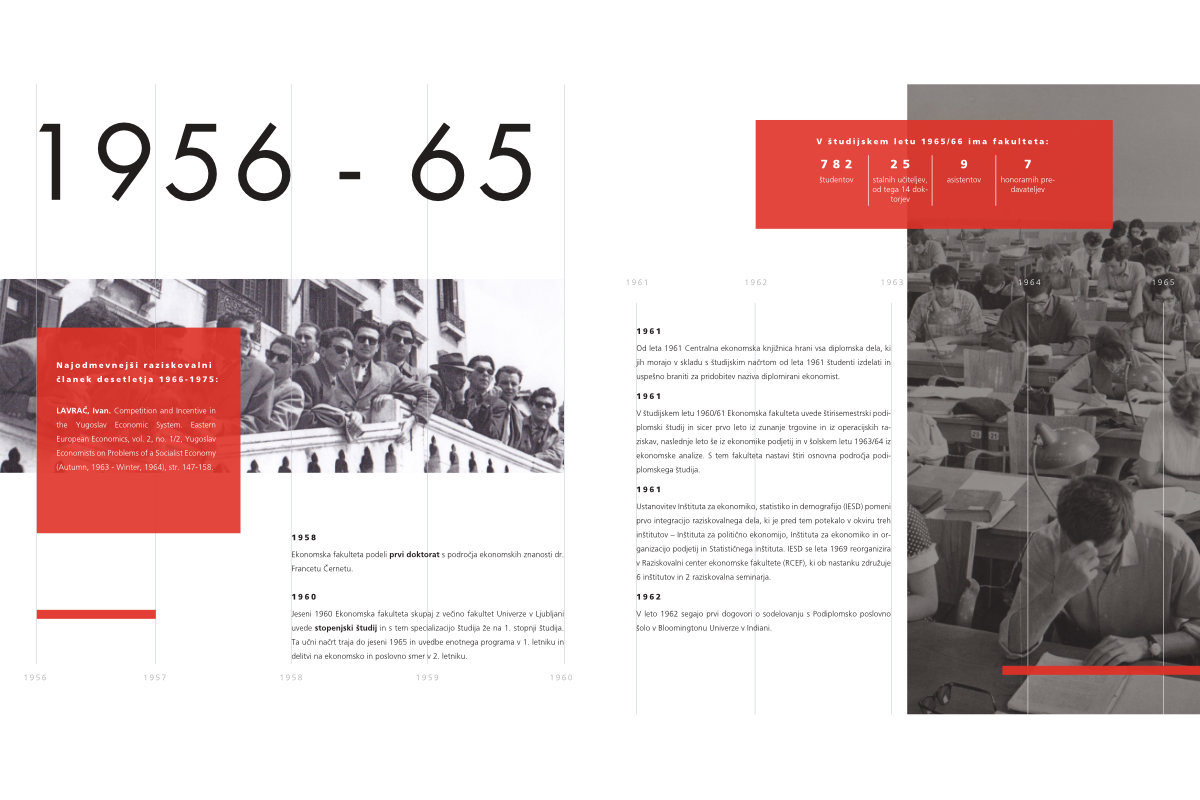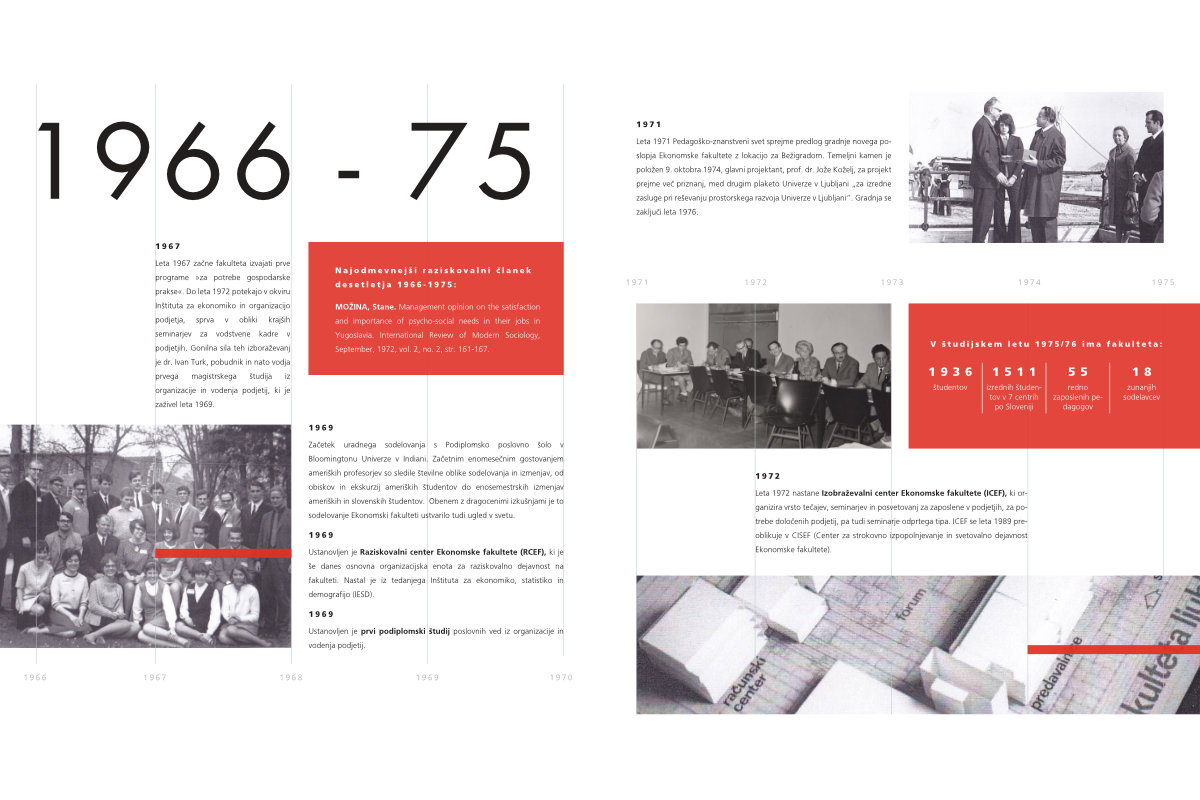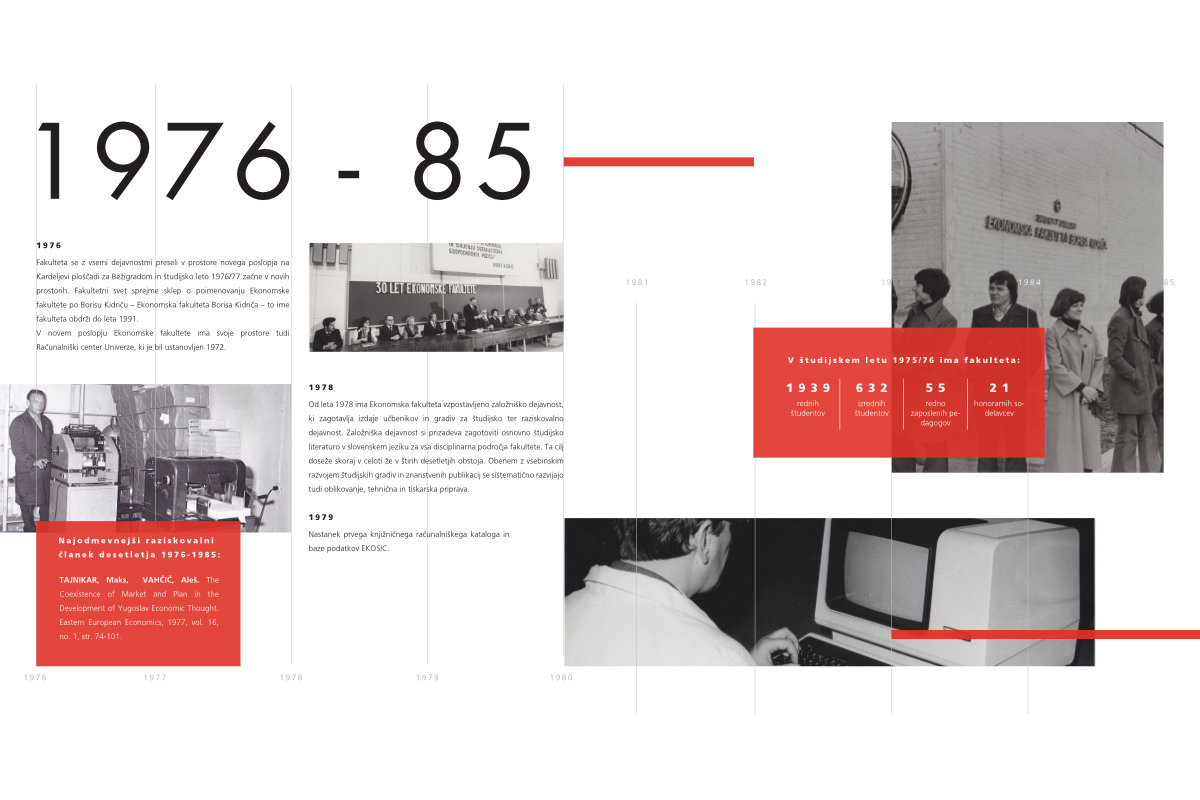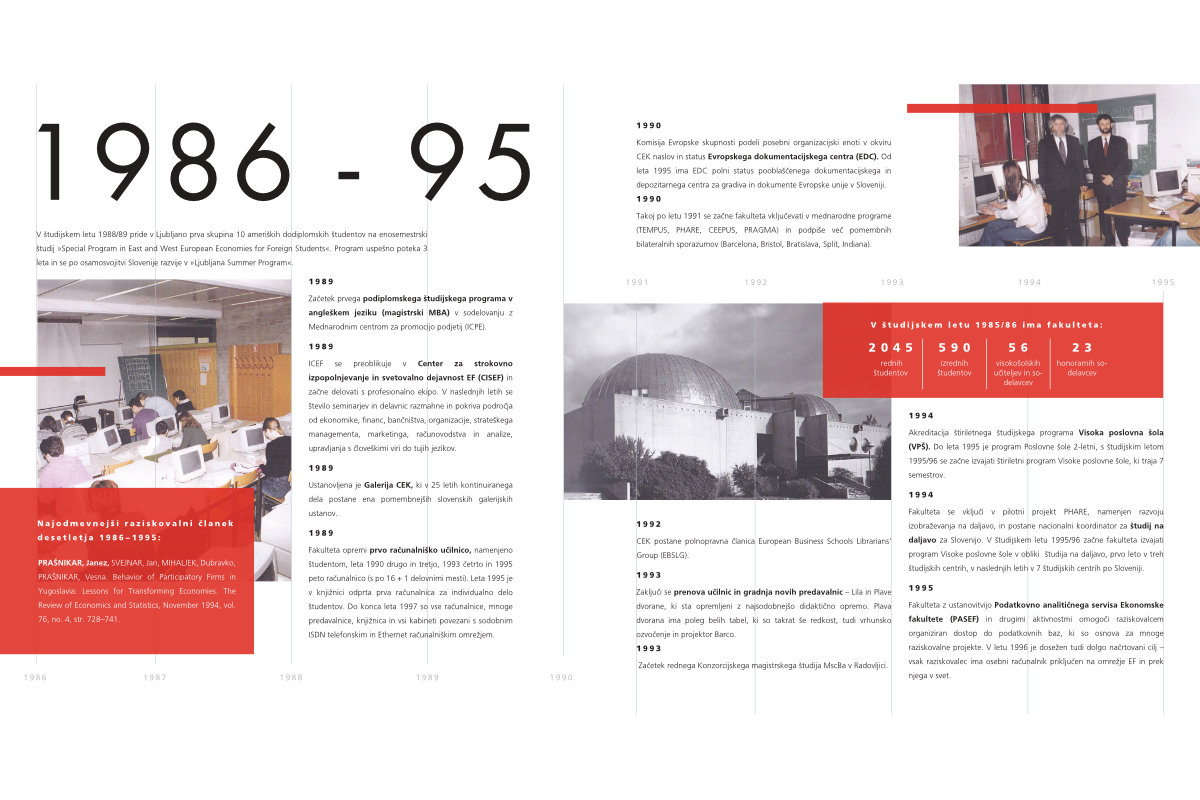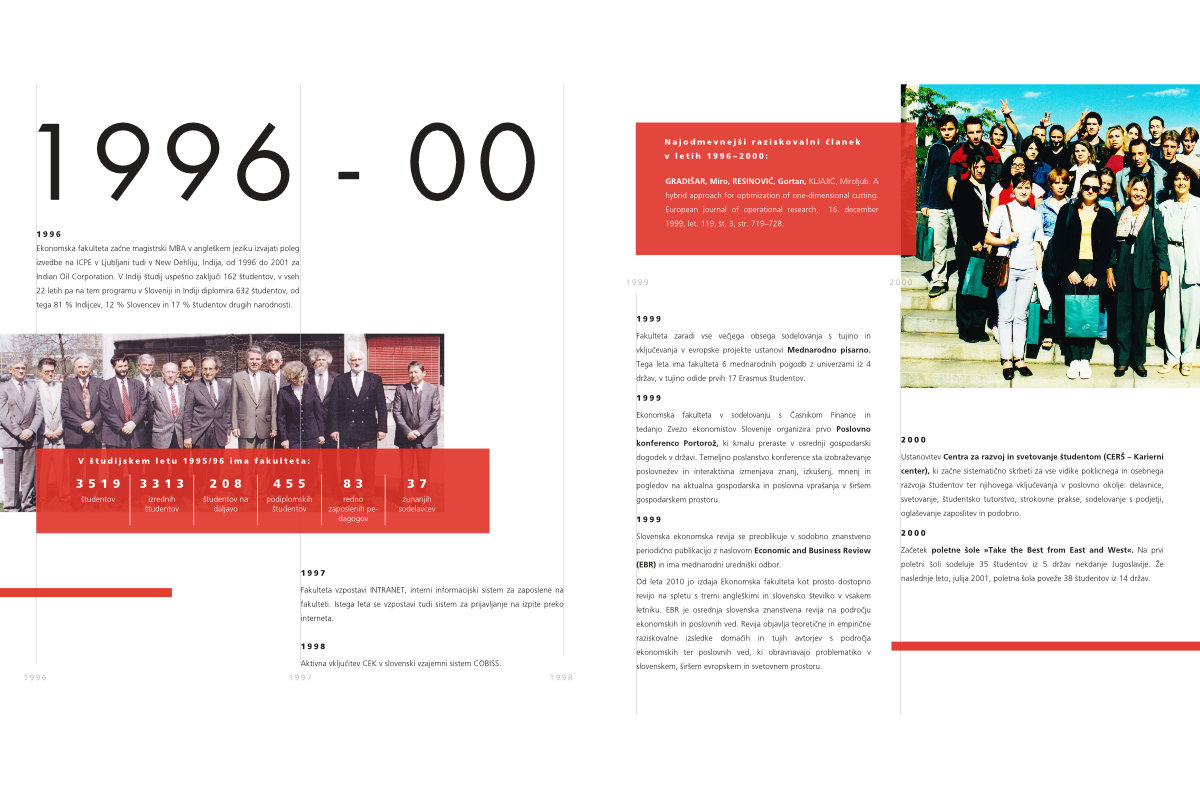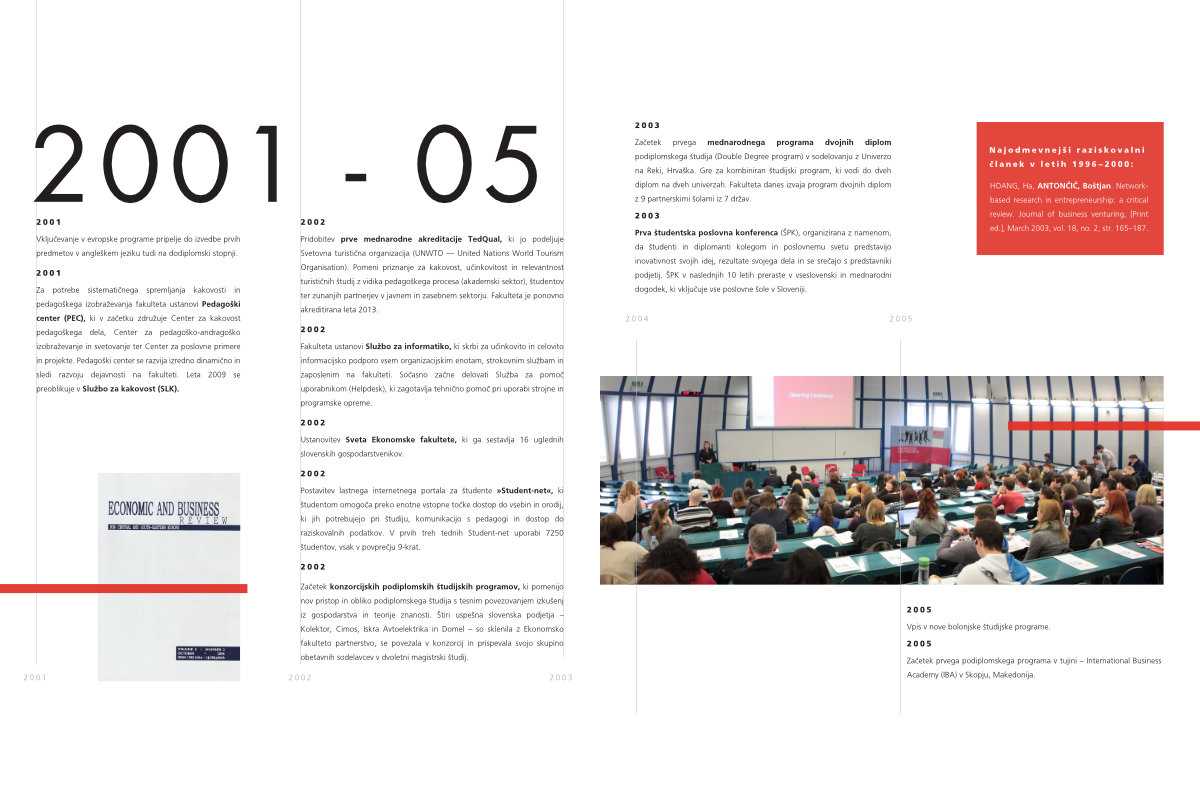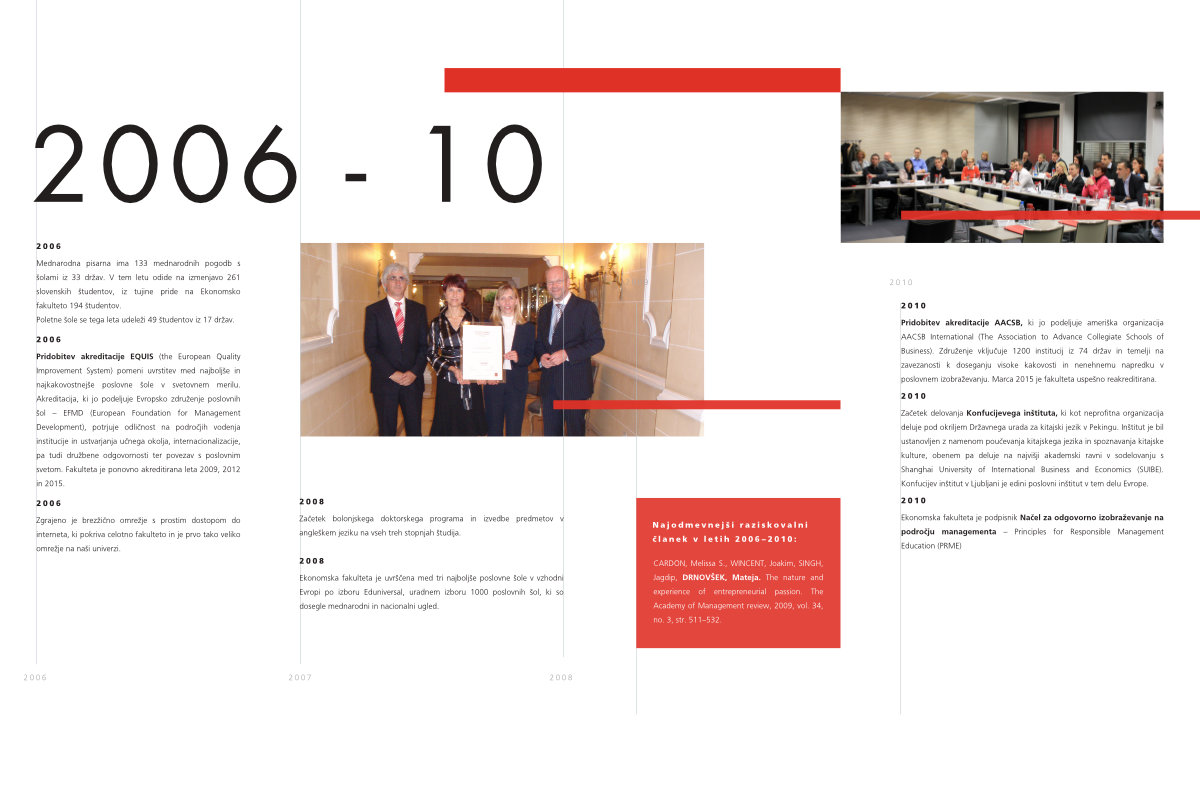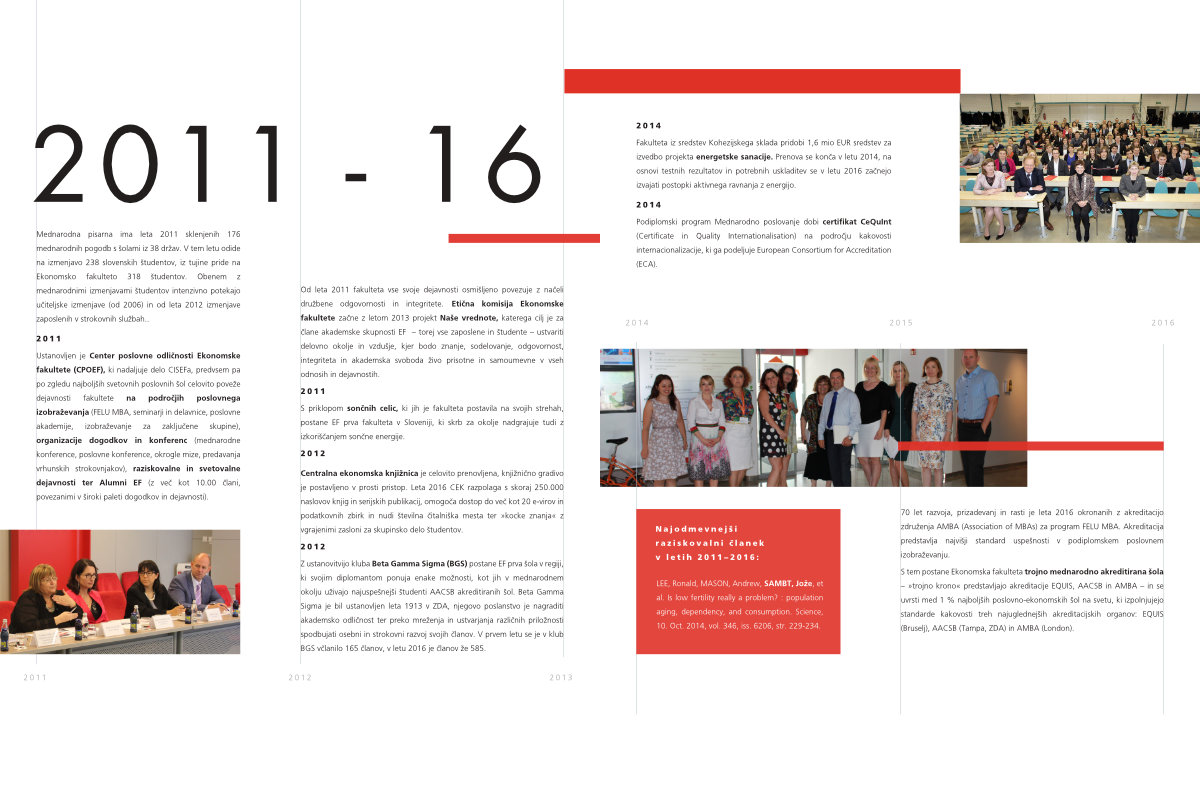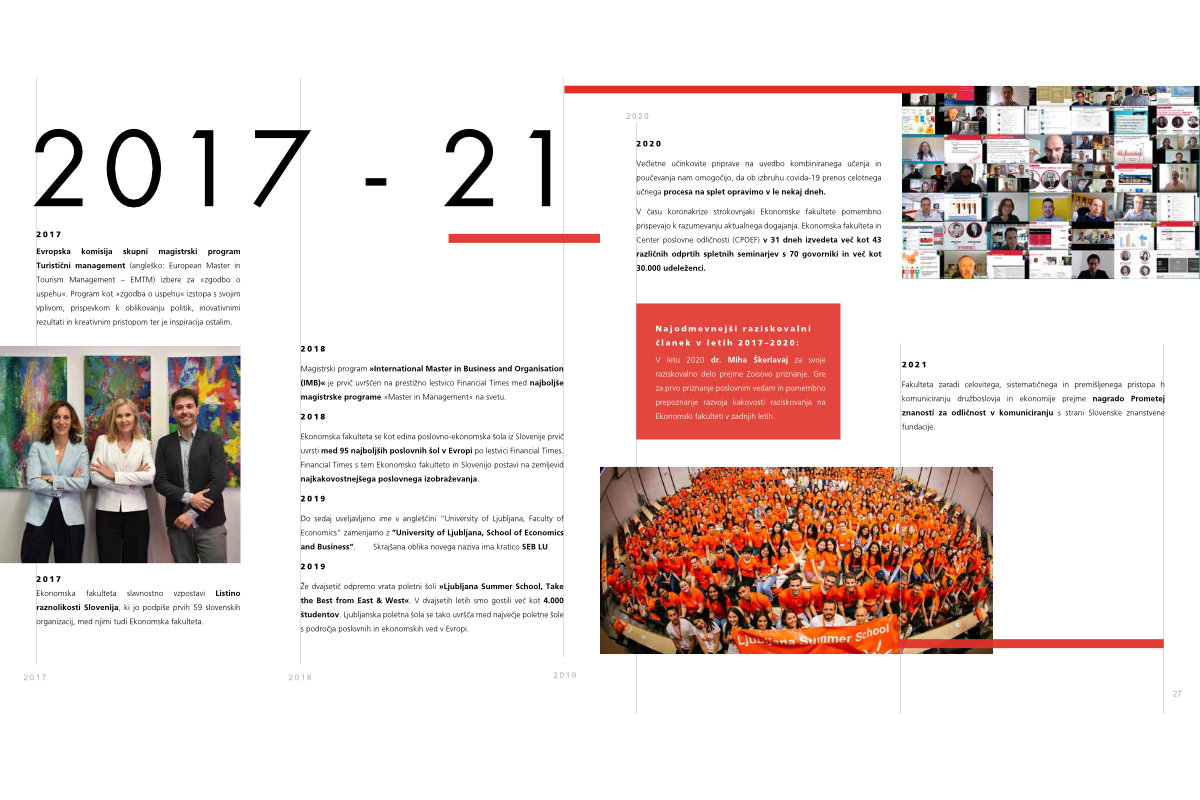
Our history
In 1946, the School of Economics and Business opened its doors to the first generation of students. 348 students attended the first year.
Today, the School of Economics and Business is Slovenia's leading educational and research institution in the field of economics and business studies, and an internationally renowned school that achieves the highest quality standards in business and economics education.
We invite you on an exciting journey through its history.
1946
With an ordinance of the Slovenian government—at the time led by Boris Kidrič—the Faculty of Economics is established on 8 March 1946 at the University of Ljubljana, with its headquarters at 27 Gregorčičeva Ulica in Ljubljana. As the “result of the situation at the time, which was teeming with novelty, a situation that wanted to quickly make up for everything that we missed out on and prove our ability to develop independently, as well as a result of a thirst of students for 'our knowledge'” (Janko Potočnik).
The first generation—348 students—begins their studies in the summer semester of the 1945/1946 academic year, the first Dean, Prof. Eng. Dragutin Gustinčič, is the only full-time professor at the time.
The second generation, consisting of 567 students, begins studying in the fall of 1946, in the winter semester of the 1946/1947 academic year.
1950
The Faculty of Economics is renamed from 'Gospodarska' to 'Ekonomska'.
1950
The Economic Journal is being published by the Association of Economists of Slovenia. It is published under this title until 1990, and from 1991 as the Slovenian Economic Journal. In 1999, it is transformed into a modern scientific periodical titled Economic and Business Review (EBR) with an international editorial board.
When the faculty is established, the first student organisation also starts operating. From the very beginning, students have been actively involved in the faculty's activities, its connections to the University of Ljubljana, and socio-political events. They take part in numerous youth work actions for the reconstruction of Yugoslavia, including the construction of the Brčko-Banovići railway line (1946), the Šamac-Sarajevo line (1947), the Student Settlement in Ljubljana, New Belgrade, the Road of Brotherhood and Unity, and elsewhere.
1953
Students of the Faculty of Economics join AIESEC, an international organisation of economics students. In the beginning, the faculty welcomes only four to five foreign interns per year, and the competition for these positions “was extremely fierce, as these internships were the only possible way to see the world at that time” (Danijel Pučko, PhD). In 1957, the number rises to 25 AIESEC internships, and in the early 1960s to between 35 and 45 foreign internships.
1954
In 1954, the Faculty of Economics merges with the Faculty of Law and until 1957, it operates as the Faculty of Law and Economics, led by Dean Prof. Jože Goričar.
1954
The faculty begins to implement a doctoral study programme.
1955
The roots of the faculty library date back to 1947. In 1955, the reading room of the Central Economics Library is opened, which is the beginning of today's most important economics library in Slovenia.
to top
1958
The Faculty of Economics awards the first doctoral degree from the field of economic sciences to France Černe, PhD.
1960
In the autumn of 1960, the Faculty of Economics, together with most of the faculties of the University of Ljubljana, introduces the cycle education model and consequently specialisation already at the first-cycle level of study. This curriculum is in effect until the fall of 1965 when a unified programme is introduced in the 1st year, and the 2nd year is divided into economics and then business programme.
1961
Since 1961, the Central Library of Economics has kept all the diploma theses that, in accordance with the 1961 curriculum, the students must write and successfully defend in order to obtain the title of graduate economist.
1961
In the 1960/1961 academic year, the Faculty of Economics introduces four-semester postgraduate studies: foreign trade and operational research in the first academic year, business economics in the following year, and economic analysis in the 1963/1964 academic year. The faculty thus establishes four basic areas of postgraduate studies.
1961
The establishment of the Institute of Economics, Statistics and Demography (IESD) marks the first integration of research work previously carried out within three institutes—the Institute of Political Economy, the Institute of Economics and Business Organisation, and the Statistical Institute. In 1969, the IESD is reorganised into the Research Centre of the Faculty of Economics (Raziskovalni center Ekonomske fakultete – RCEF), which at the time of its creation unites 6 institutes and 2 research seminars.
1962
The first collaboration arrangements with the Graduate School of Business in Bloomington at Indiana University date back to 1962.
to top
1967
In 1967, the faculty begins to implement the first study programmes “for the needs of applied economics”. Until 1972, they are conducted within the framework of the Institute of Economics and Business Organisation, initially in the form of short seminars for managers in companies. The driving force of these seminars is Ivan Turk, PhD, the initiator and afterwards the head of the first master's programme in corporate organisation and management which comes to life in 1969.
1969
The beginning of the official collaboration with the Graduate School of Business in Bloomington at Indiana University. The initial one-month hosting of American visiting professors is followed by numerous forms of cooperation and exchanges, from visits and excursions of American students to one-semester exchanges of American and Slovenian students. Along with valuable experience, this cooperation helped the Faculty of Economics gain worldwide renown.
1969
The Research Center of the Faculty of Economics (Raziskovalni center Ekonomske fakultete – RCEF), which is still the core organisational unit for research activities at the faculty, is established. It develops from the then Institute of Economics, Statistics and Demography (IESD).
1969
The first postgraduate business science programme in corporate organisation and management is established.
1971
In 1971, the Scientific Council of the Educational Research Institute adopts a proposal for the construction of a new building of the Faculty of Economics with its location in Bežigrad. The foundation stone is laid on 9 October 1974, the chief designer, Prof. Jože Koželj, PhD, receives several awards for the project, including the plaque of the University of Ljubljana “for exceptional merits in solving the spatial development of the University of Ljubljana”. The construction is completed in 1976.
1972
In 1972 the Faculty of Economics Education Center (Izobraževalni center Ekonomske fakultete – ICEF) is established. It organises a series of courses, seminars, and consultations for employees in companies, for the needs of certain companies, as well as open seminars. In 1989, ICEF becomes CISEF (Center za strokovno izpopolnjevanje in svetovalno dejavnost Ekonomske fakultete – Centre for Professional Development and Consulting of the Faculty of Economics).
to top
1976
The faculty and all its activities move to the new building on Kardeljeva Ploščad in Bežigrad; the 1976/1977 academic year begins on the new premises. The Faculty Council adopts a decision on naming the Faculty of Economics after Boris Kidrič—Boris Kidrič Faculty of Economics. The faculty keeps this name until 1991. The University Computer Science Centre, established in 1972, also has its premises in the new building of the Faculty of Economics.
1978
In 1978, the Faculty of Economics establishes a publishing company that provides editions of textbooks and materials for study and research activities. The publishing company strives to provide basic study literature in the Slovenian language for all disciplinary areas of the faculty. It almost entirely achieves this goal already in its first four decades of existence. Content development of study materials and scientific publications also coincides with the systematic development of design, technical and printing preparation.
1979
Creation of the first library computer catalogue and EKOSIC database. In the 1988/1989 academic year, the first group of 10 American undergraduate students comes to Ljubljana for a one-semester Special Program in East and West European Economies for Foreign Students. The programme takes place successfully for 3 years. After Slovenia gains its independence, it becomes the Ljubljana Summer Program.
to top
1989
The beginning of the first postgraduate study programme in English (MBA) in collaboration with the International Center for Promotion of Enterprises (ICPE).
1989
ICEF becomes the Centre for Professional Development and Consulting of the Faculty of Economics (Center za strokovno izpopolnjevanje in svetovalno dejavnost EF – CISEF) and begins operating with a professional team. In the following years, the number of seminars and workshops expands and covers areas from economics, finance, banking, organisation, strategic management, marketing, accounting and analysis, human resource management to foreign languages.
1989
The CEL Gallery is established. In 25 years of continuous work, it has become one of the most important Slovenian gallery institutes.
1989
The faculty equips the first computer classroom intended for students, the second and the third in 1990, the fourth in 1993, and the fifth in 1995 (with 16 + 1 workstations each). In 1995, the first computer classroom for individual student work opens within the library. By the end of 1997, all computer classrooms, many lecture halls, the library, and all staff offices are connected to a modern ISDN telephone and Ethernet computer network.
1990
The Commission of the European Communities grants the title and status of the European Documentation Center (EDC) to a special organisational unit within the CEL. Since 1995, EDC has had the full status of an authorised documentation and depository centre for materials and documents of the European Union in Slovenia.
1990
Immediately after 1991, the faculty begins to participate in international programmes (TEMPUS, PHARE, CEEPUS, PRAGMA) and signs several important bilateral agreements (Barcelona, Bristol, Bratislava, Split, Indiana).
1992
The CEL becomes a full member of the European Business Schools Librarians' Group (EBSLG).
1993
The renovation of classrooms and construction of new lecture halls is concluded—the Violet and the Blue Hall, which are equipped with the latest didactic equipment. In addition to whiteboards, which are still very rare at the time, the Blue Hall also has a state-of-the-art sound system and a Barco projector.
1993
The beginning of the regular Consortium Master's Study MscBa in Radovljica.
1994
Accreditation of a four-year study programme Professional Degree Programme in Business Administration (Visoka poslovna šola – VPŠ). Until 1995, it is a two-year Professional Degree Programme; in the 1995/1996 academic year, a four-year (7 semesters) Professional Degree Programme in Business Administration is implemented.
1994
The Faculty joins the PHARE pilot project aimed at the development of distance education and becomes the national coordinator for distance learning for Slovenia. In the 1995/1996 academic year, the faculty begins to implement the Professional Degree Programme in Business Administration in the form of distance learning: the first year, in three study centres, and the following years, in 7 study centres across Slovenia.
1995
With the establishment of the Data Analysis Service of the Faculty of Economics (Podatkovno analitični servis Ekonomske fakultete – PASEF) and other activities, the faculty provides researchers with organised access to databases that are the basis for many research projects. In 1996, a long-planned goal is achieved—each researcher has a personal computer connected to the FE network and through it to the world.
to top
1996
In addition to the implementation at the International Center for Promotion of Enterprises in Ljubljana, the Faculty of Economics starts conducting an MBA in English for the Indian Oil Corporation in New Delhi, India, from 1996 to 2001. In India, 162 students successfully complete their studies and in all 22 years, 632 students have graduated from this programme in Slovenia and India, 81% of which are Indians, 12% Slovenians, and 17% students of other nationalities.
1997
The faculty establishes INTRANET, an internal information system for faculty employees. In the same year, a system for registering for exams via the internet is established.
1998
Active involvement of the CEL in the Slovenian co-operative system COBISS.
1999
Due to the growing volume of cooperation with international partners and involvement in European projects, the faculty establishes the International Office. That year, the faculty has 6 international contracts with universities from 4 countries and the first 17 Erasmus students go abroad.
1999
The Faculty of Economics, in cooperation with the Slovenian newspaper Finance and the then Association of Economists of Slovenia, organises the first Portorož Business Conference, which soon becomes the central economic event in the country. The central mission of the conference is the education of entrepreneurs as well as an interactive exchange of knowledge, experience, opinions, and views on current economic and business issues in the wider economic area.
1999
The Slovenian Economic Journal is transformed into a modern scientific periodical titled Economic and Business Review (EBR) with an international editorial board. Since 2010, it is being published by the Faculty of Economics as a freely available online journal with three issues in English and one in Slovenian each year. The EBR is the central Slovenian scientific journal in the field of economic and business sciences. The journal publishes theoretical and empirical research findings of Slovenian and foreign authors in the field of economic and business sciences, which deal with issues in the Slovenian, wider European, and global area.
2000
The establishment of the Career Centre (Center za razvoj in svetovanje študentom – CERŠ) which begins to systematically deal with all aspects of professional and personal development of students and their integration into the business environment: workshops, counselling, student tutoring, professional internships, cooperation with companies, job advertising, and similar.
2000
The launch of “Take the Best from East and West” Summer School. The first summer school is attended by 35 students from 5 countries of the former Yugoslavia. The following year, in July 2001, the summer school already connects 38 students from 14 countries.
to top
2001
The involvement in European programmes leads to the implementation of the first classes in English at the undergraduate level as well.
2001
For the needs of systematic quality monitoring and pedagogical education, the faculty establishes the Pedagogical Centre (Pedagoški center – PEC), which initially combines the Centre for the Quality of Pedagogical Work, the Centre for Pedagogical and Andragogical Education and Counselling, and the Centre for Business Cases and Projects. The development of the Pedagogical Centre is extremely dynamic and follows the evolution of activities at the faculty. In 2009, it becomes the Qualitym Assurance Office (Služba za kakovost – SLK).
2002
The faculty obtains the first international accreditation TedQual, awardedmby the United Nations World Tourism Organization (UNWTO). It is regarded mas the recognition of the quality, efficiency, and relevance of tourismm studies from the perspective of the pedagogical process (academic sector), students, and external partners in the public and private sector. The faculty is reaccredited in 2013.
2002
The faculty establishes the IT Service, which provides efficient and comprehensive IT support to all organisational units, specialist services, and employees at the faculty. At the same time, the Helpdesk, which provides technical assistance for using hardware and software, becomes operational.
2002
The FELU Council, which consists of 16 prominent Slovenian entrepreneurs, is established.
2002
The establishment of “Student-net”, the faculty's own internet portal for students, which enables students to access the content and tools they need for their studies, communicate with professors, and gain access to research data through a single entry point. In the first three weeks, Student-net is used by 7,250 students, with an average of 9 sessions per user.
2002
The implementation of consortium postgraduate study programmes, which represent a new approach and form of postgraduate study that tightly connects the experience from the field of economics and the scientific theory. Four successful Slovenian companies—Kolektor, Cimos, Iskra Avtoelektrika, and Domel—enter into a partnership with the Faculty of Economics, join the consortium, and enable their promising employees to attend a two-year master's programme.
2003
The launch of the first international postgraduate double degree programme in cooperation with the University of Rijeka, Croatia. It is a joint study programme awarding two degrees at two universities. Today, the faculty implements a double degree programme with 9 partner schools from 7 countries.
2003
The first Student Business Conference (Študentska poslovna konferenca – ŠPK) is organised with the aim that students and graduates present their innovative ideas and the results of their work to colleagues and the business world and meet with representatives of companies. In the next 10 years, the conference grows into an all-Slovenian and international event that includes all business schools in Slovenia.
2005
Start of the enrolment in new Bologna study programmes.
2005
The launch of the first postgraduate programme abroad—the International Business Academy (IBA) in Skopje, Macedonia.
to top
2006
The International Office has 133 international contractswith schools from 33 countries. 261 Slovenian students go on an exchange and 194 students come to the Faculty of Economics from abroad. In 2006, the summer school is attended by 49 students from 17 countries.
2006
The faculty obtains the EQUIS (the European Quality Improvement System) accreditation, which means ranking among the best and highest quality business schools in the world. The accreditation granted by the European Foundation for Management Development (EFMD) confirms excellence in the areas of institution management and establishment of a learning environment, internationalisation, as well as social responsibility and connections with the business world. The faculty is reaccredited in 2009, 2012, 2015, and 2018.
2006
A wireless network with free internet access is built, covering the entire faculty. It is the first network of its kind at our university.
2008
The launch of the Bologna doctoral programme and the implementation of courses in English for all three study cycles.
2008
The Faculty of Economics is ranked among the three best business schools in Eastern Europe according to Eduniversal, the official selection of 1,000 business schools that have gained an international and national reputation.
2010
The faculty obtains the AACSB accreditation, awarded by the American organisation AACSB International (the Association to Advance Collegiate Schools of Business). The Association includes 1,200 institutions from 74 countries and is based on the commitment to achieve high quality and continuous progress in business education. In March 2015, the faculty is successfully reaccredited.
2010
The Confucius Institute, which operates as a non-profit organisation under the auspices of the Office of Chinese Language Council International (Hanban) in Beijing, is established. The institute is established for the purpose of teaching the Chinese language and learning about the Chinese culture while operating at the highest academic level in collaboration with the Shanghai University of International Business and Economics (SUIBE). The Confucius Institute in Ljubljana is the only business institute in this part of Europe.
2010
The Faculty of Economics is a signatory to the Principles for Responsible Management Education (PRME).
to top
In 2011, the International Office has 176 international contracts with schools from 38 countries. That year, 238 Slovenian students go on an exchange and 318 students come to the Faculty of Economics from abroad. At the same time as the international student exchanges, teacher exchanges (since 2006) and exchanges of employees in administration (since 2012) are being intensively carried out.
2011
The Centre of Business Excellence of the Faculty of Economics (CBE) is established, continuing the work of CISEF and, above all, by following the example of the world's best business schools, comprehensively connecting the activities of the faculty in the areas of business education (FELU MBA, seminars and workshops, business academies, education for closed groups), organisation
of events and conferences (international conferences, business conferences, round tables, lectures by top experts), research and consulting activities, and FE Alumni (with more than 10,000 members connected by a wide range of events and activities).
Since 2011, the faculty has been meaningfully connecting all its activities with the principles of social responsibility and integrity. In 2013, the Ethics Committee of the Faculty of Economics launches the Our values project, which aims to create a working environment and atmosphere for the members of the FELU academic community—i.e. all staff and students—where knowledge, cooperation, responsibility, integrity, and academic freedom are vividly present and self-evident in all relationships and activities.
2011
With the connection of solar cells, which the faculty has placed on its roofs, the Faculty of Economics becomes the first faculty in Slovenia to combine the concern for the environment with the exploitation of solar energy.
2012
The Central Economics Library is comprehensively renovated, enabling free access to library material. In 2016, the CEL has almost 250,000 book titles and serial publications at its disposal, provides access to more than 20 e-resources and databases, and offers numerous reading spaces and “cubes of knowledge” with built-in screens for student group work.
2012
With the establishment of the Beta Gamma Sigma (BGS) club, the Faculty of Economics becomes the first school in the region to offer its graduates the same opportunities that are provided to the most successful students of AACSB accredited schools in an international environment. Founded in 1913 in the USA, Beta Gamma Sigma has the mission of rewarding academic excellence and promoting the personal and professional development of its members through networking and creating various opportunities. In the first year, 165 students join the BGS club, and in 2016, it already has 585 members.
2014
The Faculty obtains EUR 1.6 million from the Cohesion Fund for the implementation of the Energy-Efficient Rehabilitation Project. The renovation is completed in 2014 and based on test results as well as the necessary adjustments, active energy management procedures are implemented in 2016.
2014
The International Business postgraduate programme gets the CeQuInt certificate (Certificate in Quality Internationalisation) in the field of quality in internationalisation, awarded by the European Consortium for Accreditation (ECA).
In 2016, 70 years of development, effort, and growth are recognised with the accreditation of the Association of MBAs (AMBA) for the FELU MBA programme. The accreditation represents the highest standard of achievement in postgraduate business education. The Faculty of Economics thus becomes a triple internationally accredited school—the “triple crown” is represented by the EQUIS, AACSB, and AMBA accreditations—and ranks among the 1% of the best business and economics schools in the world that meet the quality standards of the three most reputable accreditation bodies: EQUIS (Brussels), AACSB (Tampa, USA), and AMBA (London).
to top
2017
The European Commission proclaims the joint programme European Master in Tourism Management (EMTM) a »success story«. The programme stands out as a »success story« with its influence, contribution to policymaking, innovative results, and creative approach, and serves as an inspiration to others.
2017
The Faculty of Economics launches the Diversity Charter Slovenia, signed by the first 59 Slovenian organisations, including The Faculty of Economics.
2018
For the first time, the International Master in Business and Organisation (IMB) programme is included in the prestigious Financial Times Master in Management ranking among the best master's programmes in the world.
2018
The Faculty of Economics is the only such school from Slovenia to be ranked, for the first time, among the 95 best business schools in Europe according to the Financial Times ranking. The Financial Times thus puts the Faculty of Economics as well as Slovenia on the map of business education of the highest quality.
2019
Our previous official name in English “University of Ljubljana, Faculty of Economics” is replaced by “University of Ljubljana, School of Economics and Business”. The new acronym we are using is “SEB LU”.
2019
For the 20th time, we host the Ljubljana Summer School, Take the Best from East & West. In 20 years, we have welcomed more than 4,000 students. The Ljubljana Summer School is therefore ranked among the most prominent summer schools in the field of business and economics in Europe.
2020
Many years of effective preparations for the introduction of blended learning and teaching allow us to transfer the entire learning process online in just a few days after the outbreak of COVID-19.
During the corona crisis, the experts of the School of Economics and Business make an important contribution to a better understanding of the current situation. The School of Economics and Business and the Centre of Business Excellence (CBE) host more than 43 different public webinars with 70 speakers and more than 30,000 participants in 31 days.
2021
Due to a comprehensive, systematic, and carefully planned approach to communicating the social sciences and economics, the School of Economics and Business receives the Prometheus of Science for Excellence in Communication Award from the Slovene Science Foundation.

